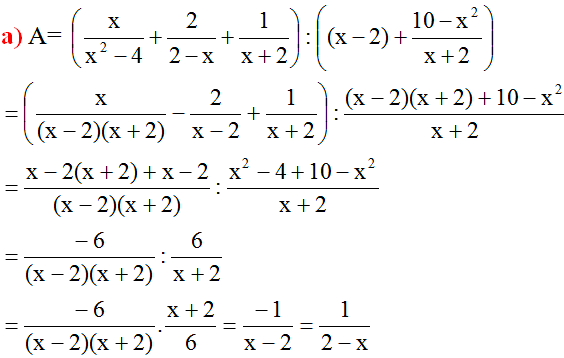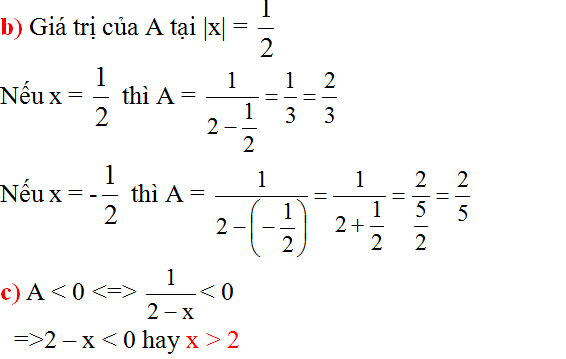Hãy nhập câu hỏi của bạn vào đây, nếu là tài khoản VIP, bạn sẽ được ưu tiên trả lời.

để A xác định
\(\Rightarrow\hept{\begin{cases}x+2\ne0\\x-2\ne0\\x^2\ne4\end{cases}}\Rightarrow x\ne\pm2\)
\(A=\frac{4}{x+2}+\frac{3}{x-2}-\frac{5x-6}{x^2-4}\)
\(A=\frac{4.x-8}{\left(x+2\right).\left(x-2\right)}+\frac{3.x+6}{\left(x-2\right).\left(x+2\right)}-\frac{5x-6}{\left(x-2\right).\left(x+2\right)}\)
\(A=\frac{4x-8+3x+6-5x+6}{\left(x+2\right).\left(x-2\right)}=\frac{2.\left(x+2\right)}{\left(x+2\right).\left(x-2\right)}=\frac{2}{x-2}\)
\(\frac{4}{x+2}+\frac{3}{x-2}-\frac{5x-6}{x^2-4}=\frac{4}{x+2}+\frac{3}{x-2}-\frac{5x-6}{\left(x+2\right)\left(x-2\right)}\)
\(=\frac{4x-8}{\left(x+2\right)\left(x-2\right)}+\frac{3x+4}{\left(x-2\right)\left(x+2\right)}-\frac{5x-6}{\left(x-2\right)\left(x+2\right)}=\frac{4x-8+3x+4-5x+6}{\left(x+2\right)\left(x-2\right)}\)
\(=\frac{2x+2}{\left(x+2\right)\left(x-2\right)}=\frac{2x+2}{x^2-4}\)
C, \(x=4\Rightarrow A=\frac{2x+2}{x^2-4}=\frac{-6}{12}=\frac{-1}{2}\)
d, \(A\inℤ\Leftrightarrow2x+2⋮x^2-4\Leftrightarrow2x^2+2x-2x^2+8⋮x^2-4\Leftrightarrow2x+8⋮x^2-4\)
\(\Leftrightarrow2x^2+8x⋮x^2-4\Leftrightarrow16⋮x^2-4\)
\(x^2-4\inℕ\)
\(\Rightarrow x^2\in\left\{0;4;12\right\}\)
Thử lại thì 12 ko là số chính phương vậy x=0 hoặc x=2 thỏa mãn
mk học lớp 6 mong mn thông cảm nếu có sai sót

\(ĐKXĐ:x\ne-3;2\)
\(\frac{x+2}{x+3}-\frac{5}{x^2+x-6}-\frac{1}{x-2}=\frac{x+2}{x+3}-\frac{5}{\left(x+3\right)\left(x+2\right)}-\frac{1}{x-2}\)
\(=\frac{x^2+4x+4}{\left(x+3\right)\left(x+2\right)}-\frac{5}{\left(x+3\right)\left(x+2\right)}-\frac{x+3}{\left(x+2\right)\left(x+3\right)}\)
\(=\frac{x^2+4x+4-5-x-3}{\left(x+2\right)\left(x+3\right)}=\frac{x^2+3x-4}{\left(x+3\right)\left(x+2\right)}=\frac{\left(x+4\right)\left(x-1\right)}{\left(x+3\right)\left(x+2\right)}\)
\(x^2-9=0\Leftrightarrow x=3\left(vì:x\ne-3\right)\)
\(\Rightarrow P=\frac{7}{15}\)
\(P\inℤ\Leftrightarrow x^2+3x-4⋮x^2+5x+6\Leftrightarrow2x+10⋮x^2+5x+6\Leftrightarrow12⋮x^2+5xx+6\)
\(................\left(dễ\right)\)
P/s: shitbo sai rồi nha bạn!Nếu không tin thì thay x = 3 vào P ban đầu và giá trị P sau khi rút gọn sẽ thấy sự khác biệt =)
ĐK: \(x\ne-3;x\ne2\)
a) \(P=\frac{x+2}{x+3}-\frac{5}{x^2+x-6}-\frac{1}{x-2}\)
\(=\frac{x^2-4}{\left(x+3\right)\left(x-2\right)}-\frac{5}{\left(x-2\right)\left(x+3\right)}-\frac{x+3}{\left(x-2\right)\left(x+3\right)}\)
\(=\frac{x^2-x-12}{\left(x+3\right)\left(x-2\right)}=\frac{\left(x-4\right)\left(x+3\right)}{\left(x+3\right)\left(x-2\right)}=\frac{x-4}{x-2}\)
b) \(x^2-9=0\Leftrightarrow x^2=9\Leftrightarrow x=\pm3\)
Thay vào điều kiện,tìm loại x = -3 .Tìm được x =3
Ta có: \(P=\frac{x-4}{x-2}=\frac{3-4}{3-2}=-1\)
c)Ta có: \(P=\frac{x-4}{x-2}=\frac{x-2-2}{x-2}=1-\frac{2}{x-2}\)
Để P có giá trị nguyên thì \(\frac{2}{x-2}\) nguyên hay \(x-2\inƯ\left(2\right)=\left\{\pm1;\pm2\right\}\)
Suy ra \(x=\left\{0;1;3;4\right\}\)

a)Vì |4x - 2| = 6 <=> 4x - 2 ϵ {6,-6} <=> x ϵ {2,-1}
Thay x = 2, ta có B không tồn tại
Thay x = -1, ta có B = \(\dfrac{1}{3}\)
b)ĐKXĐ:x ≠ 2,-2
Ta có \(A=\dfrac{5}{x+2}+\dfrac{3}{2-x}-\dfrac{15-x}{4-x^2}=\dfrac{10-5x+3x+6}{\left(x+2\right)\left(2-x\right)}-\dfrac{15-x}{4-x^2}=\dfrac{16-2x}{\left(x+2\right)\left(2-x\right)}-\dfrac{15-x}{4-x^2}=\dfrac{2x-16}{\left(x+2\right)\left(x-2\right)}-\dfrac{15-x}{4-x^2}=\dfrac{2x-16}{x^2-4}+\dfrac{15-x}{x^2-4}=\dfrac{x-1}{x^2-4}\)c)Từ câu b, ta có \(A=\dfrac{x-1}{x^2-4}\)\(\Rightarrow\dfrac{2A}{B}=\dfrac{\dfrac{\dfrac{2x-2}{x^2-4}}{2x+1}}{x^2-4}=\dfrac{2x-2}{2x+1}< 1\) với mọi x
Do đó không tồn tại x thỏa mãn đề bài

a,ĐK: \(\hept{\begin{cases}x\ne0\\x\ne\pm3\end{cases}}\)
b, \(A=\left(\frac{9}{x\left(x-3\right)\left(x+3\right)}+\frac{1}{x+3}\right):\left(\frac{x-3}{x\left(x+3\right)}-\frac{x}{3\left(x+3\right)}\right)\)
\(=\frac{9+x\left(x-3\right)}{x\left(x-3\right)\left(x+3\right)}:\frac{3\left(x-3\right)-x^2}{3x\left(x+3\right)}\)
\(=\frac{x^2-3x+9}{x\left(x-3\right)\left(x+3\right)}.\frac{3x\left(x+3\right)}{-x^2+3x-9}=\frac{-3}{x-3}\)
c, Với x = 4 thỏa mãn ĐKXĐ thì
\(A=\frac{-3}{4-3}=-3\)
d, \(A\in Z\Rightarrow-3⋮\left(x-3\right)\)
\(\Rightarrow x-3\inƯ\left(-3\right)=\left\{-3;-1;1;3\right\}\Rightarrow x\in\left\{0;2;4;6\right\}\)
Mà \(x\ne0\Rightarrow x\in\left\{2;4;6\right\}\)

Lời giải của bạn Nhật Linh đúng rồi, tuy nhiên cần thêm điều kiện để A có nghĩa: \(x\ne\pm2\)

a, ĐK : \(x\ne1;2;3;4;5\)
b, \(\dfrac{1}{x\left(x-1\right)}+\dfrac{1}{\left(x-1\right)\left(x-2\right)}+\dfrac{1}{\left(x-2\right)\left(x-3\right)}+\dfrac{1}{\left(x-3\right)\left(x-4\right)}+\dfrac{1}{\left(x-4\right)\left(x-5\right)}\)
\(=\dfrac{1}{x}-\dfrac{1}{x-1}+\dfrac{1}{x-1}-\dfrac{1}{x-2}+\dfrac{1}{x-2}-\dfrac{1}{x-3}+\dfrac{1}{x-3}-\dfrac{1}{x-4}+\dfrac{1}{x-4}-\dfrac{1}{x-5}\)
\(=\dfrac{1}{x}-\dfrac{1}{x-5}=\dfrac{x-5-x}{x\left(x-5\right)}=\dfrac{-5}{x\left(x-5\right)}\)


\(a.A=\dfrac{x^2}{x^2-4}-\dfrac{x}{x-2}+\dfrac{2}{x+2}\\ \Rightarrow A=\dfrac{x^2-x\left(x+2\right)+2\left(x-2\right)}{\left(x-2\right)\left(x+2\right)}\\ \Rightarrow A=\dfrac{x^2-x^2-2x+2x-4}{\left(x-2\right)\left(x+2\right)}\\ \Rightarrow A=\dfrac{-4}{\left(x-2\right)\left(x+2\right)}\)
b, thay x=1\(\Rightarrow A=\dfrac{-4}{\left(1-2\right)\left(1+2\right)}=\dfrac{-4}{-1.3}=\dfrac{-4}{-3}=\dfrac{4}{3}\)